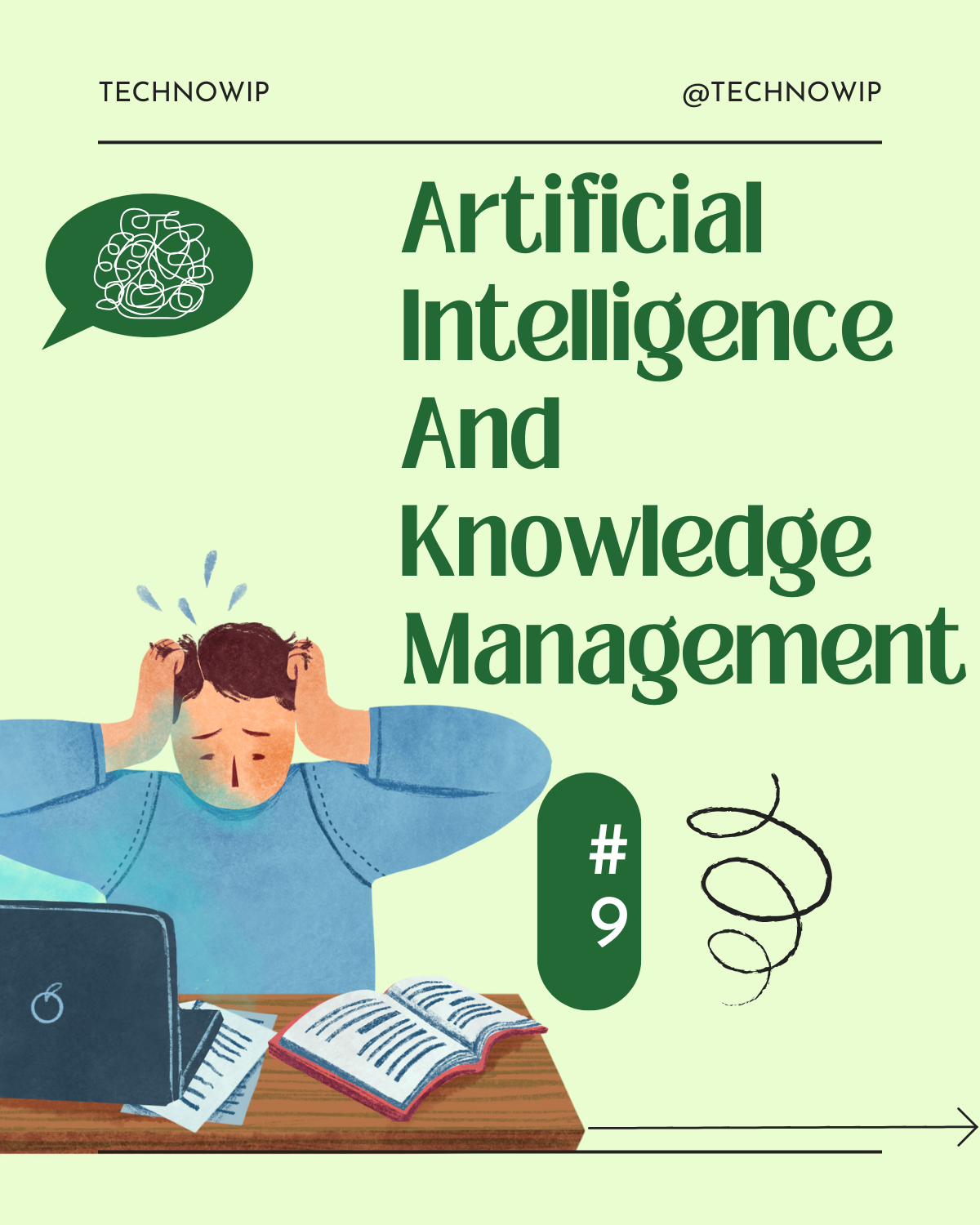Introduction
Artificial Intelligence has become a key enabler for improving efficiency. Knowledge Management (KM), the process of capturing and distributing knowledge, remains a key component of success for organizations. Artificial Intelligence and Knowledge Management combined create a powerful combination that drives smarter decisions and improved operational efficiency and innovation.
This blog will explore how AI can be integrated with KM and real-world business applications. In this blog, I will also discuss my thoughts about the changing role of AI within knowledge ecosystems.

What is Knowledge Management?
The creation, use, and management of information in an organization is known as Knowledge Management. The goal of knowledge management is to make sure that the correct information reaches the appropriate people at the proper time. It includes both explicit and tacit information, such as documented processes.
KM was traditionally a human-driven process that relied on the documentation and retrieval of knowledge. AI is now the mainstay of modern KM strategy, thanks to the increasing volumes and complexity of data.
AI’s Role in Modern Knowledge Management
Artificial Intelligence improves KM through automating tasks and analyzing huge datasets. It also identifies patterns or insights humans may overlook. AI-powered tools such as Natural Language Processing, Machine Learning, and Predictive Analytics help to make sense of the unstructured information that makes up around 80% or more of an organization’s data.
Tools like IBM Watson and Microsoft Azure Cognitive Services, for example, integrate AI in KM systems to improve efficiency and accuracy. AI transforms data into useful insights.
The Impact of AI on Knowledge Management Processes
AI impacts KM throughout its entire life cycle:
- Knowledge Discovery: AI uses automated web crawlers, semantic search engines, and other tools to accelerate the information collection process. Google Knowledge Graph is a prime example.
- AI Systems Optimize Data Storage. Data tagging with metadata and intelligent data assignment improve knowledge categorization.
- Knowledge sharing: AI-powered chatbots, virtual assistants, and recommendation engines facilitate knowledge dissemination. Tools like Slack, for example, integrate AI in order to improve team collaboration.
- Knowledge application: Businesses can use predictive analytics to predict trends, reduce risks, or take advantage of opportunities.

Case Studies: AI and Knowledge Management in Action
Case 1: Siemens
Siemens shares knowledge internally with its teams around the world using AI. The company deployed an NLP system to process technical documents, employee comments, and product information in order to identify possible solutions quickly. Siemens increased its problem-solving speed by 20 percent, saving time and money.
Case 2: Deloitte
Deloitte has implemented an AI-driven KM platform in order to manage the vast amounts of knowledge that its offices around the world generate. Deloitte’s machine-learning system analyses client interactions, compliance reports, and legal documents to provide actionable insight. This platform allowed the company to cut project delivery time by 15 percent.
My Take on AI in Knowledge Management
It is fascinating to see how AI can simplify knowledge retrieval. Manually searching for information is a waste of time and effort. As I began to explore AI tools, it became clear how much more efficient the knowledge-sharing systems could be with automation. This is a huge game changer for both individuals and groups.
Benefits of AI-Driven Knowledge Management
- AI increases productivity and efficiency by reducing the amount of manual work required for knowledge management. Automation of repetitive tasks such as data entry and information retrieval can save employees many hours.
- AI improves the decision-making process by providing data insights in real time. Tableau, Power BI, and other tools integrate AI analytics to create smarter strategies.
- AI enables KM to provide content based on individual needs and improve engagement.
- AI reduces costs by eliminating inefficiencies and allowing businesses to allocate their resources better.
Overcoming Challenges in AI-Driven KM
The integration of AI into KM is not without its challenges. Data quality, for example, remains an important issue. The quality of AI systems is only as good as the data that they are processing. When leveraging AI to share knowledge, organizations must also address ethical and privacy issues.

My Perspective on AI Challenges
Privacy is an important concern for me. I often wonder how much data we provide is being used by AI tools without our consent. Companies must address this issue transparently and develop systems that protect user privacy without compromising on value.
The Future of AI in Knowledge Management
Innovation is the future of KM. We can expect that knowledge systems will become more adaptive and intuitive with the advancements of AI. AI technologies, such as knowledge graphs powered by AI and neural networks, are expected to refine KM.
Generative AI, for example, allows companies to create new knowledge by combining existing data. This helps them tackle specific challenges. Next, AI and augmented reality will be combined to provide immersive experiences for knowledge sharing.
Why I Believe the Future is Bright
The prospect of AI-powered KM is exciting. It’s been interesting to see how companies have adapted to new technologies in order to improve their operations. I find it inspiring to watch traditional businesses evolve and embrace cutting-edge technologies, setting an example for other companies.
Real-World Trends in AI-Driven KM
Several companies are at the forefront of using AI to improve KM. Among the notable trends are:
- AI-Powered Chatbots: ChatGPT and other tools like it are revolutionizing customer service, internal communication, and employee communications.
- AI-driven KM Tools bridge the knowledge gap in hybrid and remote work environments.
- Advanced Analytics: Predictive & prescriptive analytics help businesses manage knowledge proactively.
- AI promotes lifelong learning among employees by suggesting relevant resources.
My Favorite AI Tool
I am a big fan of chatbots powered by AI. These chatbots have revolutionized the way I use technology. These tools are a great way to save time, whether it is automating repetitive tasks and answering questions or saving me from having to spend hours on the phone.
Key Metrics to Measure AI-Driven KM Success
It is important to measure the effectiveness of AI-powered KM. Businesses can track the following:
- Assess the speed at which employees can retrieve knowledge.
- Monitoring employee engagement: Participation rates to knowledge sharing initiatives.
- Automated Cost Reductions can be analyzed to reduce costs.
- Customer satisfaction: Evaluate improvements in client interaction.
Cisco, for example, reports a 30% increase in productivity of employees after implementing AI driven KM systems.

Why Businesses Need AI in KM Today
To remain competitive, organizations must leverage all their advantages. AI-powered KM is no longer an option but a necessity. Even small companies can take advantage of enhanced knowledge management with tools that are available to suit every budget.
A Personal Note on AI Adoption
When I learned of AI for KM, I assumed it only applied to big enterprises. As I researched affordable solutions, I discovered how these tools are accessible to smaller teams. I am now advocating for AI adoption in my peers.
Top Trends and Insights on Artificial Intelligence in Knowledge Management
1. What is the Role of Artificial Intelligence in Knowledge Management?
AI automates the storage and dissemination of information, transforming traditional systems for knowledge management. The AI uses machine learning for predictive analytics and natural language processing for text analysis. It also utilizes an AI-driven search engine for improved information retrieval. AI allows businesses to maximize their knowledge by handling the unstructured data that makes up 80% of all corporate information. Google and IBM are leading the charge in using AI to improve knowledge ecosystems.
2. AI-Powered Knowledge Sharing in Remote Work Environments
AI is essential to facilitating knowledge sharing in the age of remote and hybrid work. AI-enhanced platforms like Slack and Microsoft Teams (e.g.) allow employees to access vital information anywhere. AI-powered bots help remote teams with real-time answers to questions, and recommendation engines provide personalized resources. It increases productivity while minimizing knowledge silos – a challenge that is common among distributed teams.
3. Benefits of Integrating AI into Knowledge Management Systems
There are several benefits to integrating AI with KM. The benefits include:
- Automation of repetitive tasks such as tagging data and categorizing it.
- Enhance Decision Making: Real-Time insights from historic data.
- Reduced manual labor and optimization of operations.
- Employee Empowerment: Offer tools to streamline access to knowledge.
Deloitte, for example, reports a 15% improvement in project completion times when AI is used to power KM systems.
4. Overcoming Challenges in AI-Driven Knowledge Management
AI is a great tool for KM, but it can also be a challenge. Data quality issues, privacy worries, and ethical questions are all common. AI can only be as effective as the data that it uses, so data governance is a crucial step. To ensure a successful AI implementation, companies must also address employee concerns about AI. Transparency and trust are key.

5. Real-World Examples of AI in Knowledge Management
These case studies show how AI can be used to improve KM.
- Siemens uses NLP to improve efficiency and streamline knowledge sharing within the company by 20 percent.
- Cisco uses AI-powered analytics for employee onboarding to cut down the time by almost 30%.
- Accenture implements machine learning for creating dynamic knowledge graphs for global teams.
These examples show how AI can deliver measurable outcomes in real-world situations.
6. The Future of AI in Knowledge Management
AI-powered KM will be dynamic in the future as advances in generative AI (AI), neural networks, and augmented Reality (AR) are made. GPT-4 and other generative AI tools can create new knowledge from data. AR-based training programs could also be created using AR. These technologies are enabling more intuitive and personalized knowledge systems that will transform how companies manage and share their information.
7. How AI Improves Knowledge Accessibility
AI allows for faster and more accurate access to knowledge. Users can find the right data faster with semantic search engines like Elasticsearch and AI-enhanced content indexing. AI-powered KM solutions personalize results by analyzing the user’s behavior. This allows for a more tailored search experience. Accessibility is crucial in industries such as healthcare and education, where up-to-date knowledge can make a significant impact.
8. The Role of Natural Language Processing in Knowledge Management
Natural Language Processing plays a vital role in modern KM by interpreting text-based information. NLP helps organizations process unstructured data such as emails, social media posts, and reports. AI-powered KM tools, for example, use NLP in order to recognize patterns, emotions, and takeaways. This allows organizations to gain actionable insight from large textual datasets.
9. AI in Knowledge Management for Small Businesses
Despite resource limitations, small businesses can still benefit from AI-driven KM. SMEs can organize their knowledge and effectively share it with affordable solutions like AI-powered CRMs, such as HubSpot. AI empowers SMEs to compete in the digital world by automating processes and providing actionable insights.
10. Measuring the ROI of AI-Driven Knowledge Management
AI-based KM systems must be evaluated for their return on investment. The following metrics are key:
- Knowledge Access speed: reduced time for finding information.
- Automating tasks can save you money.
- Employee engagement: Collaboration and knowledge sharing improved.
- Customer satisfaction: faster response times and improved service delivery.
These metrics help businesses to understand the benefits AI-KM can bring.
11. Ethical Considerations in AI-Powered Knowledge Management
In AI-driven KM, ethics play a major role. Businesses must make sure their AI systems are compliant with the law, respect privacy, and do not produce biased results. Transparency is key to building trust with employees and clients. Microsoft, for example, has developed frameworks that address ethical AI issues proactively.
12. AI and Knowledge Management in Healthcare
Healthcare organizations use AI to enhance patient outcomes. AI analyses medical records, clinical guidelines, research papers, and other sources to produce actionable insights. IBM Watson Health, for example, helps doctors diagnose complex diseases by analyzing vast amounts of medical data within seconds. AI-driven KM also reduces staff workload by streamlining administrative processes.

Conclusion
Artificial Intelligence (AI) and Knowledge Management represent more than just a buzzword; these two concepts are redefining the way organizations use and harness information. Businesses can increase efficiency, encourage innovation, and remain ahead of the curve by integrating AI with KM.
While the journey has its challenges, the rewards far exceed the obstacles. The future of work is going to be more intelligent, faster, and connected as organizations invest in AI.
FAQS
What’s the relation between Artificial Intelligence (AI) and Knowledge Management (KM)?
AI improves Knowledge Management by automating the data collection, analysis, and sharing process.
What is the impact of AI on knowledge access in organizations?
AI-powered tools allow for faster retrieval and accuracy of information via semantic search and personalized recommendation.
How can AI be used to improve knowledge management?
AI increases efficiency, lowers costs, improves decision-making, and allows for better knowledge-sharing practices.
What industries are most likely to benefit from AI-driven knowledge management?
Significant improvements are seen in industries such as healthcare, education, and technology.
What real-world examples can you give of AI used in Knowledge Management?
AI is used by companies like Siemens, Deloitte, and Cisco to improve knowledge sharing and productivity.
What are the challenges that organizations face in implementing AI into KM systems?
Data quality concerns, employee resistance, and privacy issues are all common challenges.
Natural Language Processing: What is its role in Knowledge Management
NLP is a powerful tool that helps companies analyze unstructured data and extract actionable information.
How much can small businesses afford to spend on AI-based Knowledge Management Tools?
AI solutions that are affordable and accessible for businesses of any size.
What will the future look like for AI in Knowledge Management?
AI, generative AI, and AR will be integrated with AI to produce intuitive knowledge systems.
What are the best ways to measure AI Knowledge Management success?
You can measure ROI by using metrics like employee satisfaction, customer satisfaction, and cost savings.

